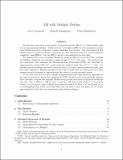AM with Multiple Merlins
Author(s)
Aaronson, Scott; Impagliazzo, Russell; Moshkovitz Aaronson, Dana Hadar
DownloadAaronson_AM with.pdf (394.8Kb)
OPEN_ACCESS_POLICY
Open Access Policy
Creative Commons Attribution-Noncommercial-Share Alike
Terms of use
Metadata
Show full item recordAbstract
We introduce and study a new model of interactive proofs: AM(k), or Arthur-Merlin with k non-communicating Merlins. Unlike with the better-known MIP, here the assumption is that each Merlin receives an independent random challenge from Arthur. One motivation for this model (which we explore in detail) comes from the close analogies between it and the quantum complexity class QMA(k), but the AM(k) model is also natural in its own right. We illustrate the power of multiple Merlins by giving an AM(2) protocol for 3SAT, in which the Merlins' challenges and responses consist of only n[superscript 1/2+o(1)] bits each. Our protocol has the consequence that, assuming the Exponential Time Hypothesis (ETH), any algorithm for approximating a dense CSP with a polynomial-size alphabet must take n[superscript (log n)1-o(1)] time. Algorithms nearly matching this lower bound are known, but their running times had never been previously explained. Brandao and Harrow have also recently used our 3SAT protocol to show quasipolynomial hardness for approximating the values of certain entangled games. In the other direction, we give a simple quasipolynomial-time approximation algorithm for free games, and use it to prove that, assuming the ETH, our 3SAT protocol is essentially optimal. More generally, we show that multiple Merlins never provide more than a polynomial advantage over one: that is, AM(k) = AM for all k=poly(n). The key to this result is a sub sampling theorem for free games, which follows from powerful results by Alon et al. And Barak et al. On sub sampling dense CSPs, and which says that the value of any free game can be closely approximated by the value of a logarithmic-sized random subgame.
Date issued
2014-06Department
Massachusetts Institute of Technology. Department of Electrical Engineering and Computer ScienceJournal
Proceedings of the 2014 IEEE 29th Conference on Computational Complexity (CCC)
Publisher
Institute of Electrical and Electronics Engineers (IEEE)
Citation
Aaronson, Scott, Russell Impagliazzo, and Dana Moshkovitz. “AM with Multiple Merlins.” 2014 IEEE 29th Conference on Computational Complexity (CCC) (June 2014).
Version: Author's final manuscript
ISBN
978-1-4799-3626-7